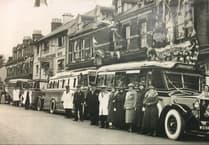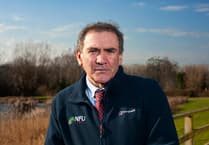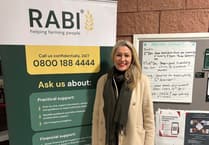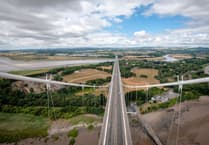AS nocturnal creatures who are rarely glimpsed, an owl gazing at you with imperial scorn from the corner of some abandoned barn or perched on the branch of a moonlight dappled tree, is always a sight to behold and a memory to treasure.
However, what was once scarce has become even scarcer and just one of the reasons why Richard Lloyd Evans has initiated a Barn Own conservation project that is looking to turn the tide in favor of these otherworldly lords of the skies.
There are a number of reasons you don’t see as many Barn Owls as times gone by. The mechanization of farming, the loss of hedgerows and wildlife rich fields, the effects of secondary rodenticides the marked increase in human habitats and the risk from busy roads and fast traffic have all played their part on their dwindling numbers. However, a key factor in the population decline is the loss of their traditional roof/nest sites.
As their name suggests, Barn Owls love a barn. Farmers who owned barns full to the rafters with cereal crops would often have special “owl windows” made to invite their feathered friends in and keep the local rodent population in check.

However, as more and more barns were left to rot and ruin, or converted into houses, the owls were left to fight for a place in other preferred habitats such as hollow tree cavities, and of course, nest boxes!
Here’s where Richard and Project Nestbox come into play. Since 2009 he has been on a mission and travelled all around the local area, placing nest boxes in as many places as possible, not just for the welfare of Barn Owls, but anything with a beak and wings.
“I’ve been all over Monmouthshire, Torfaen, and Powys with my nest boxes,” explained Richard. “There’s quite a few up on the Blorenge whose wooded areas have become something of a stronghold for Pied flycatchers, Spotted Flycatchers, and Redstarts.”
With all three species of birds on the amber and red lists due to they population decline, it is reassuring to know that one of Abergavenny’s seven hills, with a little help from Project Nestbox is offering them some much needed shelter from the storm.
Now turning his beady eye to the local owl population, Richard is keen to get as many people, particularly famers, on board, to erect as many nest boxes in barns and open farmland as possible.
“I’ve developed a good working relationship with both Llanover and Llanarth Estates, but I’d like to get more farmers involved in the project, because Barn Owls love open farmland. It’s where they feel at home. I know at times farming can be a closed community and someone such as myself can be viewed as an outsider, but it’s for the benefit of everyone if we can create more habitats for Barn Owls and increase their numbers,” said Richard.
As a rule Barn Owls tend to frequent the same nest site for the span of their existence. So by agreeing to such a little thing of having a nest box on your land you could be having a huge impact on the local wildlife.
“The nest boxes aren’t intrusive or unsightly in any shape or form,” explained Richard, “But they can make a difference to the world we live in and the creatures we share it with.”
Project Nestbox is very much a labor of love. Richard and his team of volunteers rely on a lot of donations from local builders’ merchants for the costly materials to make the nest boxes.
“There’s no funding for this. It’s all done on very much a beg and borrow basis. You might say it’s run on a wing and a prayer,” joked Richard, who added, “Any money we do make is ploughed straight back into the project. Someone may commission me to make a nest box for their garden, but then we’ll use that money to make a couple of others that we’ll place somewhere else for free.”
Richard’s passion for the winged wonders who help brighten up our world with their colour and chirp began at a very early age.
He told the Chronicle he was about six or seven when he was first bitten by the bird bug!
“My dad was a retired carpenter and when I was a boy he showed me how to make a nest box and we erected it in nearby woodland. About six weeks later we returned to the site and I saw something that pretty much changed the way I saw the world overnight. Inside the box were about ten Blue tit eggs surrounded by feather and wool. It triggered a lifelong passion and it’s pretty much why I do what I do today.”
Although he’s always been an avid bird lover it wasn’t until a serious car crash 14 years ago left him house bound for a few months that he rediscovered a cherished childhood pastime.
“I’ve never been one to sit around doing nothing and as I slowly recovered I began constructing nest boxes again and the joy I felt watching all sorts of species of birds use them to create their nest was second to none,” he revealed.
Deciding to take his pet project and run with it, Richard and his team have since made over 5000 nest boxes scattered all over Wales. He also works with local schools to help children understand the importance of nest boxes.
He explained, “It’s kind of nice to think we’ve helped birds all over the country find a home, but there’s still so much work to do, and if anyone can help we’ll love to hear from you. Particularly if you live on a farm or have an old barn!”
To put it simply, owls have round heads, large eyes, and a short, hooked bill. They hunt at night and eat mice and other small animals. Yet more so than any other bird, owls carry something of the mystery and otherworldliness of nature on their wise and wondrous wings that are said to ferry them unnoticed between this world and the next.

With the help of Richard and Project NestBox just maybe sightings of Barn Owls in this neck of woods might become a little more common sometime soon.
Richard said, “Last year was an exceptional year for Barn Owl numbers in Wales, and I think the world is finally waking up to the fact that we should not take then for granted. The world has changed and is changing, and if we don’t do our part, they and other species of birds may not be around in the near future.”
If you’d like to get involved with Project NestBox you can reach Richard Evans on 07568 535563 or email [email protected]




Comments
This article has no comments yet. Be the first to leave a comment.